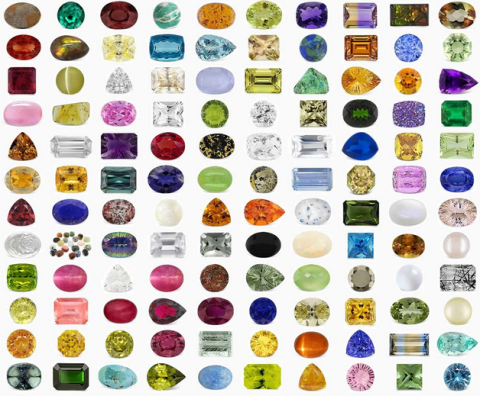Most gems can be divided into precious and semi-precious. Only the most rare and expensive gems are classified as precious. Diamonds, emeralds, rubies, pearls, and sapphires are all considered precious gems. Most remaining gems – such as varieties of quartz (including amethyst, opal, and blood stone) – are semiprecious.
Identifying the quality level of the stones used within gemstone jewelry is important and will ensure that any gemstone rings, necklaces or other pieces you purchase will retain their value. Since gemstones have no grading system, their evaluation can be more complicated than diamonds. However like diamonds, starting with the Four Cs can be helpful:
- Color – The color of gemstones used for jewelry is important. Generally clear, medium-tone, intense and saturated primary colors are the most preferred. Avoid stones with color that is too dark or color that is muddled. The brighter and more vivid the color, the better.
- Clarity – After color, gemstone clarity is the next most important factor in valuation. Clear, transparent gemstones with no visible flaws are the most valued. With no standardized grading system, clarity can be difficult to judge, but if flaws aren’t visible in the face up position, then they rarely matter. Some gemstone varieties, like emerald and red tourmaline, are rarely seen without inclusions, so gemstone jewelry that uses high quality stones from these varieties will be more expensive.
- Carat –Â Gemstones are sold by weight, not by size and prices are calculated per carat. It’s important to recognize that some gems are denser than others, so similarly sized stones of different varieties may differ greatly in cost. In addition, larger stones of some varieties can be quite rare and much more expensive like ruby, emerald, sapphire and tourmaline.
- Cut – Although not the most important factor in evaluating the quality of gemstones, cut is very important in how the stone is used in gemstone jewelry. A good cut is something that may not cost more but can add or subtract a lot of beauty. A well-cut faceted gemstone reflects light back evenly across its surface area when held face up. The best way to judge cut is to look at similar gemstones next to each other.
Birthstones
| Gemstone | Color | Month |
|---|---|---|
| Garnet | Reds | January |
| Amethyst | Purples | February |
| Aquamarine | Blues | March |
| Diamond | White | April |
| Emerald | Greens | May |
| Alexandrite | Red to Green | June |
| Ruby | Red | July |
| Peridot | Lime Green | August |
| Sapphire | Blue | September |
| Opal | Multi-colored | October |
| Citrine | Yellows | November |
| Tanzanite | Blues | December |

